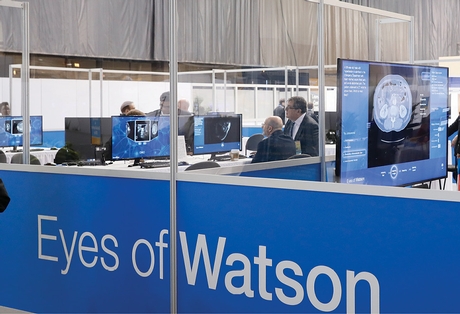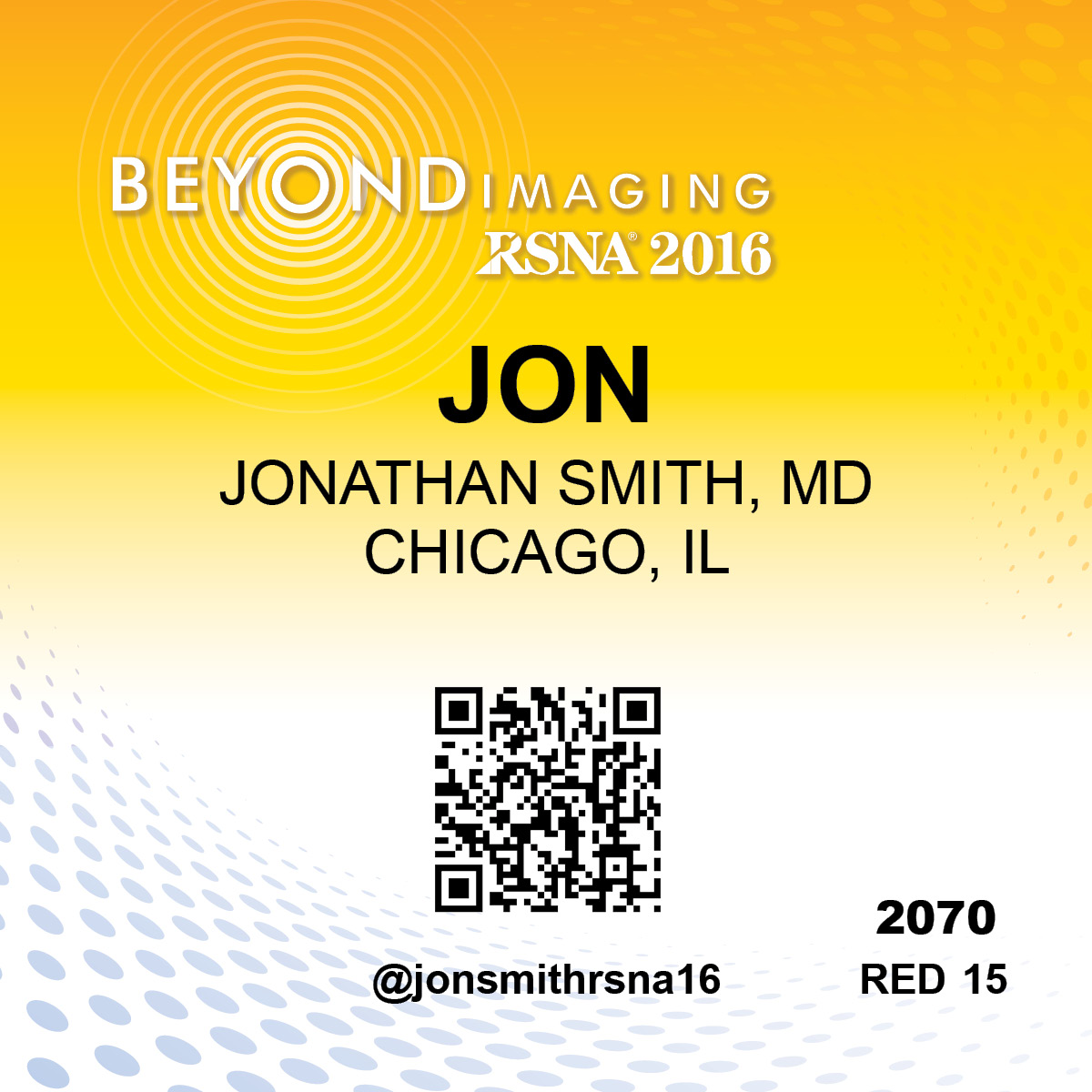RSNA 2016 Sessions Explore the Potential of Machine Learning
Monday, Nov. 28, 2016
Learning Center Exhibits
Monday – Friday, 8 a.m.-5 p.m.
AI and Machine Learning in Radiology Demonstration: The Eyes of Watson
With advances in machine learning and artificial intelligence, a new role is emerging for machines as intelligent assistants to radiologists in their clinical workflows. Computers can pre-analyze large amounts of imaging and text in electronic health records using deep learning to identify patterns and perform clinical inference using a priori clinical knowledge to assemble relevant information for diagnosis by radiologists.
But what systematic clinical thought processes are these machines using? Are they similar enough to those of radiologists to be trusted as assistants? At the Eyes of Watson demonstration, participants can select a case from various subspecialties, attempt to make a diagnosis, and then see Watson's process for the same case. Attendees can watch the inner workings of Watson as it attempts the case and then help evaluate its approach. Learn how machines can assist radiologists, reducing the time to diagnose and increasing efficiency in workflows.
Deep Learning: What the Radiologist Needs to Know
Deep learning (DL) is rooted in machine learning and artificial neural networks, concepts which focus on teaching computers to learn to solve problems. This session will focus on the application of DL to radiology and its potential to add significant value to the radiologist's interpretation of complex images.
IN003-EB-X | IN Community, Learning Center
Mind in the Machine: A Radiology Primer on Machine Learning
Presenters will define machine learning (ML), review applications of ML, offer an overview of fundamental steps in common ML algorithms and discuss future directions.
IN014-EC-X | IN Community, Learning Center
Artificial Neural Networks: A Machine Learning Algorithm for Image Analysis in Radiology
Presenters will discuss neural networks — machine learning (ML) algorithms that use computational architectures inspired by the organization of the mammalian visual cortex — and give an overview of an artificial neural network (single-layer vs. convolutional neural networks).
IN101-ED-X | IN Community, Learning Center
Deep Learning with Convolutional Neural Networks for Radiologic Image Classification
The presenter will review recent research developments in deep learning, particularly with respect to convolutional neural networks applied to image classification.
IN117-ED-X | IN Community, Learning Center
Monday, Nov. 28
Deep Learning: A Primer for Radiologists
Presenters will review the key concepts of deep convolutional neural networks, illustrate applications of deep learning (DL) techniques for lesion detection, classification and monitoring, and discuss the potential benefits of computer assisted diagnosis with DL techniques.
12:45-1:15 p.m., | IN111-ED-MOB7 | IN Community Learning Center, Station #7
Machine-Learning-Based Delineation Approach for Gross Tumor Volume Region of Three Types of Lung Tumors using Planning CT and PET/CT Datasets
Presenters will discuss research on the effectiveness of a computer-assisted delineation system for gross tumor volume region of three types of lung tumors with a machine learning classifier based on the planning CT/PET datasets.
12:45-1:15 PM | PH010-EC-MOB | PH Community, Learning Center

Visitors to the Eyes of Watson demonstration can watch Watson at work.
Tuesday, Nov. 29
Deep Learning: An Example of Big Data Applications
This session provides a technical overview of machine learning (ML) and deep learning (DL), illustrate applications of ML and DL in radiology, and examines challenges in deploying ML and DL in radiologist workflow and productivity demands.
8:30-10:00 AM | RC354C | Room: S404AB
Wednesday, Nov. 30
Improving Reading of T2 MRIs through Deep Learning
Presenters discuss a possible direction for automating the process of finding new relevant imaging biomarkers for disease using a relatively uncommon disease in a heterogeneous patient group. Researchers trained a neural network to identify both the standard TNM staging as well as the 12-month outcome variable.
12:45-1:15 PM | IN247-SD-WEB2 | IN Community, Learning Center, Station #2
Ensemble Deep Learning for the Improvement of the Performance of Computer-aided Detection of Polyps in CT Colonography
Presenters discuss research evaluating an ensemble deep learning (EDL) in the improvement of the detection performance of computer-aided detection (CADe) of polyps in CT colonography.
10:40-10:50 AM C SSK17-02 | Room: S404AB
Deep Learning & Machine Intelligence in Radiology
- An Introduction to Deep Learning & Machine Intelligence: What the Radiologist Needs to Know
- Applying Deep Learning to Image Diagnosis
- Applying Deep Learning to Radiology Workflow Quality and Efficiency

Radiologists evaluate Watson's approach to a case.
4:30-6:00 PM | RCC45 | Room: S501ABC
Thursday, Dec. 1
Hot Topic Session: The Promise of Machine Learning (and Pattern Recognition) in Radiology
7:15-8:15 AM | SPSH50 | Room: E350
Quantitative Radiomics, Big Data, and Deep Learning in Precision Medicine
The presenter will discuss advances in computer power and machine learning algorithms that are allowing for computer-extracted features, both from clinically-driven computer-extraction systems (such as those from computer-aided diagnosis) and deep learning methods, to yield "radiomics" — the high throughput conversion of image sets into a multi-dimensional feature space.
1:30-2:45 PM | PS50C | Room: E450A
Daily Bulletin Coverage of Machine Learning
Read Tuesday's Daily Bulletin for coverage of the session, "Use of Deep Learning in Breast Cancer Risk Assessment: Evaluation of Convolutional Neural Networks on a Large Clinical Dataset of FFDMs."
Read Thursday's Daily Bulletin for coverage of the Controversy Session, "Elementary, My Dear Watson: Will Machines Replace Radiologists?"




 Home
Home Program
Program Exhibitors
Exhibitors My Meeting
My Meeting
 Virtual
Virtual Digital Posters
Digital Posters Case of Day
Case of Day

